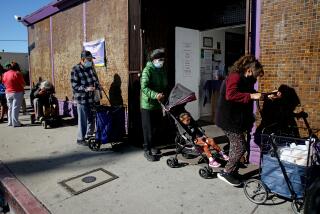Organizers hope South L.A. healthcare initiative expands
- Share via
Maria Sencion has been feeling dizzy. Not all the time, but for a few minutes each week — just enough to make her wonder if she should see a doctor.
With that nagging worry in the back of her mind, the 47-year-old mother of four went on Saturday to the healthcare enrollment fair staged by Building Health Communities South Los Angeles.
Inside the Fremont High School gymnasium, orange-shirted volunteers offered guidance on the type of health insurance available to Sencion, her husband and three of her children, none of whom currently has coverage.
Sencion was one of roughly 70 who showed up at the event, staged to inform residents about the patchwork of healthcare programs provided by the county, the state and the Affordable Care Act, President Obama’s healthcare reform law. That tepid response discouraged organizers, who said South Los Angeles has more than 231,000 uninsured.
Coordinators of the health fair had 150 breakfasts, 200 lunches and 300 bags of healthful groceries available to attendees. Had the event been focused on finding employment, or addressing an urgent crime issue, it probably would have attracted a larger number of people from the neighborhood, said Sonya Vasquez, policy director for Community Health Councils, which advocates for expanded coverage.
“Even though they know healthcare is important, they don’t always understand how to talk about it, or the importance of talking about it,” said Vasquez, whose group participates in the South L.A. initiative.
Vasquez said federal healthcare reform is designed to ultimately streamline the array of programs available to the public, particularly those with low incomes. Under the current arrangement, insurance programs for California children don’t necessarily apply to their parents. Coverage available at the county level isn’t always provided by the state.
State officials created a temporary program for residents with preexisting conditions, such as asthma, until a similar measure takes effect under the federal healthcare law in 2014. Illegal immigrants, who make up more than 40% of the uninsured in South L.A, aren’t covered under Obama’s healthcare initiative, Vasquez said.
Of those who did show up, one man hoped to find healthcare coverage for his 45-year-old brother, who just got out of prison and is out of work. An unemployed woman in her 60s wanted information on treatment for diabetes but said she had little money to contribute toward her coverage.
Tanesiha Johnson, 39, took in a two-hour PowerPoint presentation from the Greenlining Institute, looking for insurance information that could help her 22-year-old daughter, who she said is in dire need of dental work, and her 17-year-old daughter, who is pregnant. Johnson has health insurance but wasn’t aware that the new federal law allows her children to remain on her policy until they are 26.
“That makes me feel a lot better,” she said.
Building Healthy Communities is a creation of the California Endowment, which is focusing on South L.A. and 13 other communities around the state. The California Endowment is working with a number of other nonprofits to look at the way public safety, insurance coverage, development decisions and other issues make a section of South L.A. healthy or unhealthy.
Tamu Jones, a program manager with the California Endowment, voiced hope that future events for the South L.A. initiative would draw more participants. “As we build relationships with this community over time, our ability to connect will increase,” she said.
Despite the light turnout, Saturday’s event was a success for Maria Alvarado, a 48-year-old parent volunteer at Fremont High School. Alvarado said her family, which lacks insurance, spent more than $2,200 on medical care two years ago after her youngest son was bitten by a snake while camping.
After a consultation with volunteers, Alvarado found state coverage for her two youngest sons, as well as a separate program for herself. In Spanish, she said she planned to get her paperwork together so that she can schedule a doctor’s appointment.
“It’s been two years since I’ve had a checkup,” she said.
More to Read
Sign up for Essential California
The most important California stories and recommendations in your inbox every morning.
You may occasionally receive promotional content from the Los Angeles Times.














